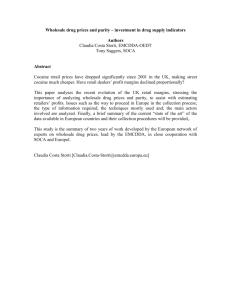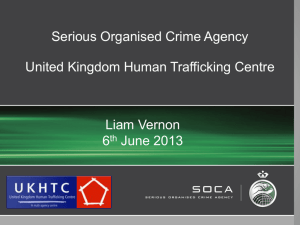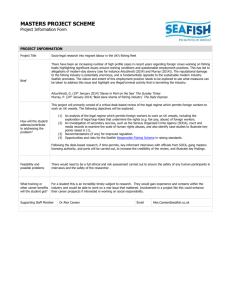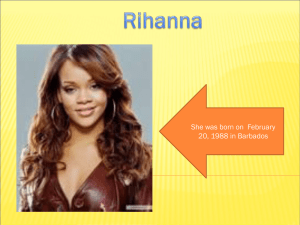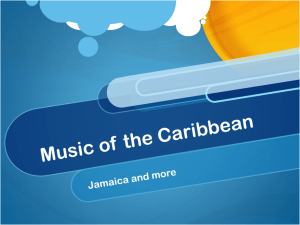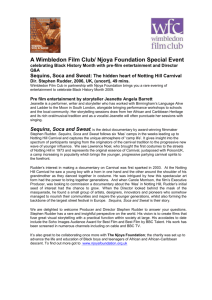Soca research
advertisement
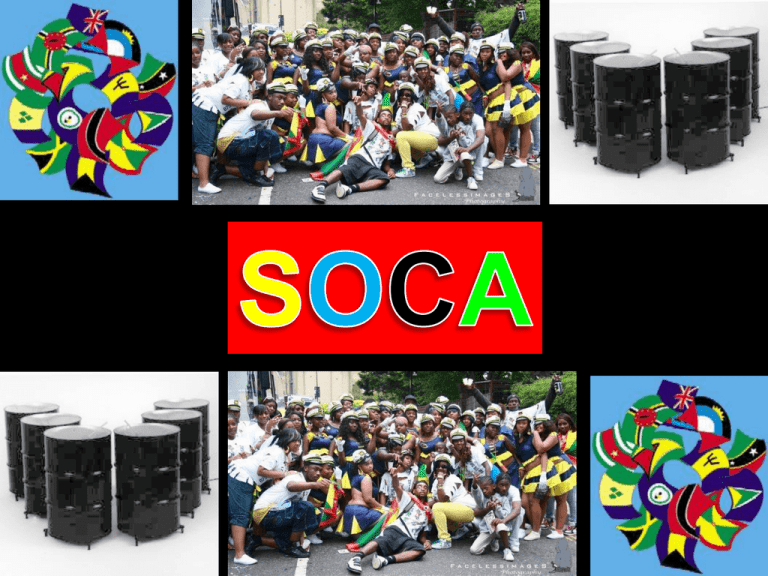
Soca is a type of dance music which originally evolved from the Calypso music genre in the Caribbean island of Trinidad and Tobago. Soca is distinguished from other genres because of its combination of melodious pitches and sounds that are accompanied by an insistent percussion. Moreover, the first two letters at the beginning of the words soul and calypso have been used to form the word Soca. This has been cleverly generated to accentuate what the genre of Soca is about. Garfield Blackman who was born on the 6th October 1941 in Trinidad and Tobago was the famous musician who generated the genre of Soca. In 1963, he became famous with his hit song “Clock and Dagger”. He was now referred to as Lord Shorty. In the beginning, he composed his own songs and for other young calypsonians, such as Maestro and Baron, in the form of the calypso genre. Due to Lord Shorty’s compositions, Baron made a hit single called ‘Severe Licking’. Furthermore, in the 1970s, Lord Shorty began to experiment with calypso by combining it with chutney( music from Trinidad’s East Indian population). Hence the Soca genre was formed. Likewise, Lord Shorty was renounced as the Father of Soca and is still recognised nowadays by a wide Soca audience. Moreover, in the 1980s Lord Shorty became disenchanted as Soca was being reincorporated into sexual impropriety humour, as well as for social commentary. This went against Lord Shorty’s vision for Soca. In addition to this, he converted into a Rastafarian, hence he changed his name to Ras Shorty I. In the late 1980s, Ras moved on from Soca and created a new music style which fused gospel music and reggae together, it was known as Jamoo. Nevertheless, in our present society, Soca has been revolutionised by several Caribbean countries, into a variety of musical styles. There is a vast majority of key artists who come from the different islands in the Caribbean, yet they all play an important role in the development of Soca. Machel Montano •On the 24th November 1974 he was born in the Port of Spain, Trinidad. •He has made great steps moving into the Soca mainstream. •In March 2007, he made history as he was the first Soca artist to sell out two back-to-back shows in New York’s Madison Square Garden. •Reviews of his sold out performances helped him as a skilled showman who was able to please the crowd. Destra Garcia •She was born on 10th November 1975 in Trinidad and Tobago. •She came from a musical family. •At the 10 years old she began singing calypso. •She started off entering interschool calypso competitions which later led her to participating in Junior Calypso Monarch competitions around different nations. • Although, Destra has never won a the Soca Monarch or Carnival Road March title, but in 2003 and 2009 she came close to second. •Nevertheless, Destra has persevered to become successful in the local music industry. •In 2008 she made a song featuring Sean Paul entitled ‘Free It Up’. Rupee •He was born on 10th September 1975 in Barbados. •In 1997, he joined a popular Bajan band named Coalishun. •In 2000, he became a solo artist after he became interested in the Soca genre. His first hit single, ‘Ice Cream’ followed his enjoyment for Soca music. • A song titled ‘Jump’ from his first album gave him the Road March title at carnivals in Barbados and America. • ‘Tempted to touch’ a song from his second album landed him a worldwide record deal with Atlantic records. Patrice Roberts Other notable Soca artists include: •Rikki Jai •Alison Hinds •Byron Lee & The Dragonaires •Kevin Lyttle •Bunji Garlin •Iwer George •And Many More. •She was born in 1986 in Trinidad and Tobago. •Her career began at the age of nine when she entered and won the Sangre Grande Junior Calypso Monarch Competition. From this she received a lot of ratings. •In 2000, she was renowned as ‘Toco Personality Winner’; this too gave her recognition. •In 2003, Patrice contributed across the globe when she performed at The Royal Opera House in London. Soca is aimed at a wide variety of people although it is a niche genre if you were to compare it to a genre which is always in the media, such as RnB, Hip Hop and Rock. Nevertheless, the Soca is a timeless genre in the sense that it is for all generations to enjoy. As Soca originates from the Caribbean, it has a huge fan base around the Caribbean islands. However, Soca invites other cultures to take pleasure in it. Moreover, people become fond of Soca because of its vibrant rhythms. •Rapso comes from Eastern Caribbean and it combines calypso with hip-hop. •Chutney Soca is where Soca evolved from and it is usually performed by Chutney musicians. •Ragga Soca fuses Soca and Jamaican Dancehall to create an up-tempo beat with electronic instruments and bass. •Parang Soca originated from Venezuela and it combines Calypso, Soca and Latino music. •Steelband-Soca uses Steel Pans in Soca and Calypso music. Soca is perceived in many ways by the public, for example, some people say that Soca brings carnivals all around the world to life and without it carnivals will not have that ‘wow’ factor. Moreover, Soca is an exotic genre due to its origin and people enjoy listening to it as it has very lively rhythms, however the pace of Soca varies to suit the needs of all audiences. Furthermore, Soca music is not only associated with its rhythm or beat, colours help to connote several opinions and emotions. Dazzling colours are worn by various artists to show how joyful Soca music can be. Likewise, Soca music puts you in the mood to want to dance and jump around to express high spirits. Record labels include: •A.P.I Record Label •Ice Records (signed artists: Mighty Sparrow, Lord Kitchener) •Independent Record Label (signed artists: Machel Montano & Patrice Roberts) •Krazi Muzic Records(signed artist: Destra Garcia) •Bush Records (signed artist: Rikki Jai) •JGN( signed artist: Ras Shorty) •Atlantic records- a well known American record label (signed artist: Rupee) WE Magazine is a West Indian Entertainment and lifestyle magazine which gives insight on the West Indian culture. It is aimed to satisfy its audience by celebrating the vibrant arts, culture and natural beauty of the Caribbean and its people. The WE magazine team includes Jef Lo ( the operator of Soca website Toronto Lime) and Jason Singh (president of Soca bookings). In addition, WE magazine is free of charge and it is distributed at the end of each month in West Indian outlets. As it is free this could enhance its audience as they will be more willing to purchase it if they do not have to pay. Likewise, interviews with Soca artists such as Machel Montano are published which enhances its audience even more. Nevertheless, due to the fact the magazine is not sold worldwide its audience is limited. In 2007 alone, the magazine circulated around 70,000 copies. Toronto-Lime.com Since its beginning, Toronto-Lime.com has evolved into the most popular Soca entertainment website. It has attracted over 100,000 visitors and generated more than 8,000,000 hits daily. In 2004 the website received a nomination for 'Best Urban Website' and was also named 'Website of The Year' at the Canadian Caribbean Awards. In addition, in three consecutive years Toronto-Lime.com was privileged to win 'Favourite Soca Website' award by the SAO International Soca Awards. It has even managed to maintain this award by winning it every year since it initially won. Toronto-Lime.com is not only the best Caribbean website but it is also in the ranking amongst 6,000 other websites globally. The site includes entertainment news, artist profiles, fact files, historical records, worldwide Carnival info, the largest Soca/Calypso play list on the net, and much more. Notting Hill Carnival This is Europe’s biggest festival which initially began in 1966. It takes place every August bank holiday and attracts an audience of more than one million. Over twenty miles, a vast majority of masquerade bands embrace the roads to dance with over forty sound systems blaring out music, mostly Soca. Likewise, over 40,000 volunteers put up stores to sell various Caribbean foods. Indeed, this festival it displayed all over the media for positive and negative reasons. Although it is a event where people come to release their happiness, from year to year it is dispirited by knife and gun related tragedies. These tragedies are always captured by the media. I believe that Soca will maintain the audience it already has. However, if the media is used more it could help boost its audience as at the moment Soca is not common to many people in the UK, especially because such genres as hip hop and rock are highly perceived by the media. Nevertheless, Soca is a timeless genre and so has a wide variety of audiences from all ages. Likewise, as we live in a multi society world Soca is liked by all ethnicities which is good for future publicity.
